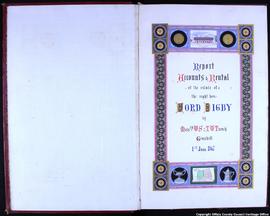Annual report, accounts and rental for year ending June 1880, wherein Digby contrasts the Geashill estate favourably with other estates in the country during this 'almost unprecedented agricultural disaster of the past season'. Reports that although the usual remittance is reduced by £1500 due to increased arrears, there was an overall net increase in rental income at £17,307.1.8.
Reports that there is an increase in the number of unskilled labour available and therefore more drainage works and land improvement projects were carried out with the result that there was hardly a person on the estate in want of work compared with other parts of Ireland where there was great distress and beginnings of famine. Notes that many of the projects are being executed under the Board of Works. To offset any failure of the potato crop on the estate, Digby reports that he has imported 50 tonnes of champion seed potatoes from Scotland and distributed among the tenantry.
Construction works included a pair of double cottages at Killeigh; a further addition to Thomas Cobbe's farmhouse at Annagharvey; a labourer's cottage for Mr Delamere at the Meelaghans; and the repair of the roof and offices at Ballymooney House. Forestry works included clearing and replanting of Scrubb Wood and new plantations at Gorteen and Derryadd.
Notes that the past year will long be remembered by every landlord and tenant 'as one of the most disastrous ever experienced', with bad weather, failure of root crops, and 'a potato crop more diseased than any since the famine years.' Warns that the Land League have seized upon the bad harvest as a means to increase agitation amongst tenants and have organised meetings the length and breadth of Ireland, and hopes that forthcoming legislation by the government will solve the Irish Land Question.

